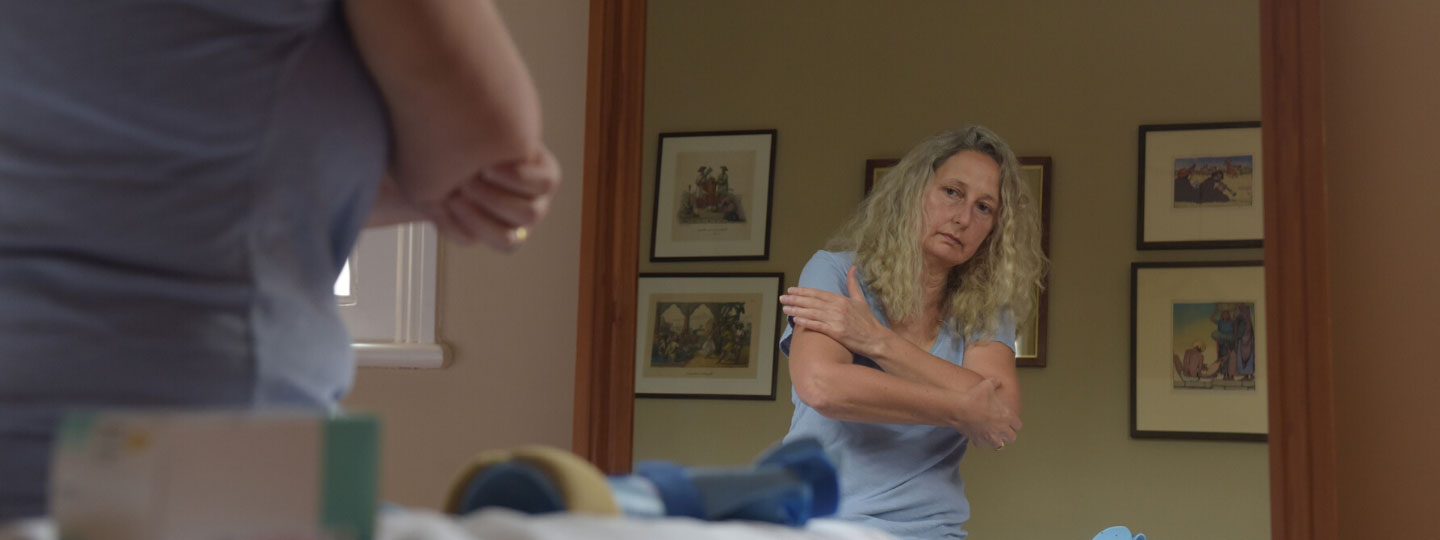Current care failing to close ‘inequality gap’ in musculoskeletal pain
24 July 2025
Researchers have found that current care for musculoskeletal conditions like back pain and osteoarthritis is failing to close an important ‘inequality gap’ in pain and disability.
Musculoskeletal (MSK) pain conditions are the most common reasons for long-term pain and disability in adults, and include conditions like low back pain, neck pain, osteoarthritis, and other pain problems which are not thought to be due to an underlying inflammatory condition like rheumatoid arthritis or gout.
Patients with these conditions living in more deprived areas typically present with more severe pain and disability and more complicated health needs than patients in more affluent neighbourhoods.
Study to close the 'inequality gap'
The researchers, funded by the Nuffield Foundation and Versus Arthritis and hosted at Keele University, investigated whether current care received by patients in more deprived areas is sufficient to close this ‘inequality gap’.
The study included over 1800 patients from 30 GP practices in North Staffordshire and Stoke-on-Trent, covering a range of neighbourhoods and areas which are considered “deprived” or “affluent” based on the Index of Multiple Deprivation, which ranks all neighbourhoods in England on things like income, employment, education, housing, and health.
Patients completed questionnaires about the pain they experienced, how it interfered with their daily lives, and their satisfaction with their care.
The researchers also looked at medical records to determine what type of treatment patients received and followed up with the patients three to six months later to see how their conditions improved following treatment.
Their results, published in BMJ Open, confirmed that the patients from more deprived backgrounds started off with worse pain and disability. But while all groups of patients showed improvement over time, the gap between the groups remained six months later, and even widened slightly.
Additionally, the study found that opioid prescriptions were more common among patients living in the most deprived areas, with 30% of people from deprived areas given opioid prescriptions compared to 19% of people in less deprived areas. When looking at the likelihood of receiving an opioid prescription, when compared to the most deprived areas and adjusted for social demographics and survey related covariates, patients from the least deprived areas were 46% less likely to receive an opioid prescription.
Given previous research highlighting both the limited effectiveness of opioids for musculoskeletal (MSK) conditions and their potential harms, this finding further underscores the health inequalities faced by people with MSK conditions in deprived communities. The researchers added that more needs to be done to improve accessibility and effectiveness of care for people living with musculoskeletal pain conditions in the most deprived communities, and to recognise the need for action on the wider causes of health inequalities that are often beyond the control of healthcare services.
Professor George Peat, who led the research and is a Visiting Professor at Keele University and a Professor at Sheffield Hallam University, said:
“Narrowing health inequalities is a prominent commitment in the recently announced NHS 10-year plan. This applies to musculoskeletal pain conditions which are major causes of long-term pain, disability, work loss, and misery.
“Our findings suggest that current levels and patterns of care are insufficient to reduce this inequality gap. Improving the resourcing and quality of healthcare services could help but there must also be attention to the wider social conditions that contribute to inequalities in musculoskeletal health in the first place.”
Deborah Alsina MBE, Chief Executive of Versus Arthritis, added:
“This important research shines a stark light on what too many people living with arthritis already know – that where you live and your socioeconomic status can have a profound impact on the pain you experience and the care you receive. This is not just a treatment gap, it is a symptom of a healthcare system that continues to leave the most disadvantaged behind.
“Tackling these deep-rooted inequalities must be at the heart of how we transform MSK services. That means bold investment in local, personalised, evidence-based care and addressing the wider social and economic factors that shape health. With over 10 million people in the UK living with arthritis, we need urgent and sustained action to ensure MSK conditions are taken seriously as a major public health issue, so no one is left in pain because of their postcode.
“That’s why the UK Government’s 10 Year Health Plan for England should be backed up by a dedicated National MSK Framework to ensure the needs of people with arthritis and MSK conditions are prioritised and not left behind in the Government’s efforts to transform the NHS.”